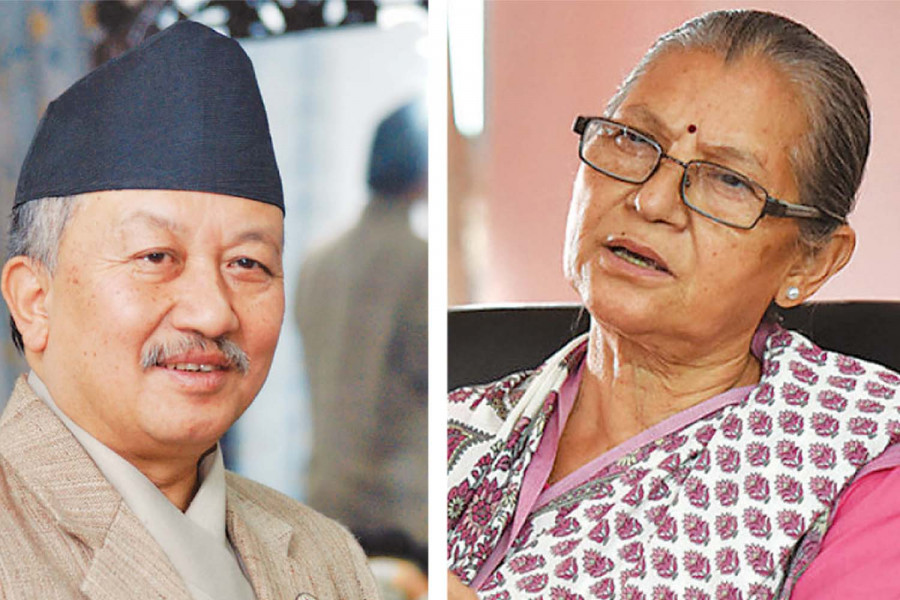
With the CPN (Maoist Centre) chairman Pushpa Kamal Dahal becoming prime minister with the backing of the second largest party, the CPN-UML, the latter is set to get two other major positions—the President and the Speaker.
After Dahal decided to join the UML camp following Congress President Sher Bahadur Deuba’s refusal to allow him to lead the government for the first half of the next five-year term, the new coalition of seven parties will now distribute among themselves 35 constitutional positions including the President, Vice-President, Speaker, Deputy Speaker, National Assembly chair and vice-chair, chief ministers, speakers, deputy speakers and provincial chiefs of seven provinces.
The two parties have agreed to allow the UML to choose the President for next five years while the Speaker will be changed once there is change in the head of the government.
“Our party will have the President for the full five years and take the prime minister and the Speaker by turns with the Maoist Centre,” said Prithvi Subba Gurung, deputy general secretary of the UML, who also heads the party’s publicity department.
The terms of President Bidya Devi Bhandari and Vice-President Nanda Bahadur Pun expire on March 13 and the election to replace them must be held a month prior to that, on February 12.
With the swearing in of the new prime minister and seven ministers including three deputy prime ministers, people are now curious about the picks for the next President and the Speaker of the House of Representatives.
Among the UML’s top leaders, two names are being discussed as candidates for new President: party vice-chair and former Speaker Subas Chandra Nembang and another vice-chair Asta Laxmi Shakya.
Many UML leaders think party chairman Oli will choose Nembang, a veteran politician who also led the constitution-making process as Constituent Assembly chair, to act as the new President; the ceremonial head of the state also acts as the constitution’s guardian. The soft-spoken Nembang is also seen as someone who can effectively coordinate and communicate with all of Nepal’s top leaders.
Shakya, one of the senior-most leaders in the UML, is respected both in and outside the party for her clean image and a struggle-filled political career. Though Shakya has reportedly improved her relations with incumbent President Bidya Devi Bhandari, she may not be able to make it to the top position of the country. Many leaders in the Oli camp still mistrust her as someone who sided with the rival panel led by Madhav Kumar Nepal before the latter split to form his own party.
According to Article 70 of the constitution, the President and Vice-President shall be from different sex or communities. If Nembang clinches the Presidential position, either a female or a candidate representing a different ethnic community needs to be elected Vice-President.
The Speaker should be elected within 15 days of the first meeting of the House of Representatives. The government must call the first meeting of the House of Representatives by January 11—within a month of the declaration of the results of November 20 federal and provincial polls.
As the UML will get the Speaker for the first half-term, it is likely to field either party secretary Chhabilal Bishwakarma, who was elected from Rupandehi-1, or party’s deputy general secretary Prithvi Subba Gurung, elected from Lamjung, for the post.
However, as Gurung has shown an interest in joining the government, the party could field Bishwakarma as the Speaker.
“Among Gurung and Bishwakarma, the latter will get the preference as he also represents the Dalit community,” said a senior party leader. “Gurung seems to be more interested in joining the government.”
Though the two parties have agreed to share the two major positions (President and Speaker), the new coalition, which is yet to take full shape, will decide on other positions soon as some other political parties may also join the ruling camp.
“We are not yet a part of the ruling coalition. As of now, we are only in a relationship of cooperation,” said Upendra Yadav, chairman of Janata Samajbadi Party. “The seven parties should soon discuss the division of major constitutional positions.”
Besides the UML and the Maoist Centre, the ruling coalition has Rabi Lamichhane-led Rastriya Swatantra Party, which has 20 seats in the House of Representatives; Rajendra Lingden-led Rastriya Prajatantra Party, with 14 seats; Upendra Yadav-led Janata Samajbadi Party with 12 seats; CK Raut’s Janamat Party with six seats; and Ranjita Shrestha-led Nagarik Unmukti Party with four seats (including one independent).
So far, the RSP, which boycotted the provincial polls, has already gotten deputy prime minister and home ministry while Raut's party has one federal ministry and is chief claimant of the chief minister of the Madhesh province.












